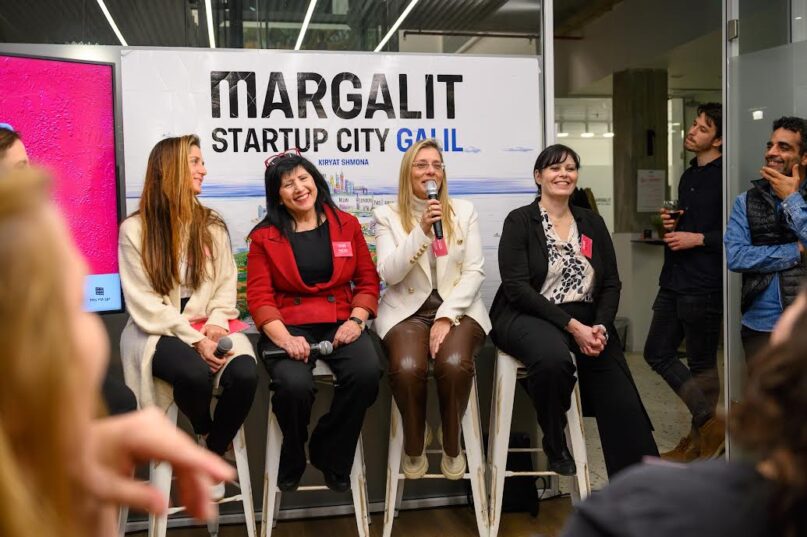
By Judy Lash Balint
(JNS) More than 100 Israeli women and girls marked the United Nation’s International Day of Women and Girls in Science last week at a lively gathering held at the sleek new Margalit Startup City Galil (“Galilee”) building in Kiryat Shmona, Israel’s northernmost city.
The evening was initiated by Galiladies, a community of entrepreneurial women based in the Margalit Startup City Galil building.
Galiladies was launched less than a year ago at there with the goal of creating opportunities for women entrepreneurs in the business, social, public and technological spheres. The group now has 1,000 members that include Jewish, Arab, Druze, secular and religious women, members of kibbutzim and moshavim, as well as residents of Kiryat Shmona.
Erel Margalit, founder and chairperson of the Jerusalem Venture Partners (JVP) venture capital fund, opened the $4.2 million Margalit Startup City Galil building in September 2021, with the goal of creating an international FoodTech and AgroTech center that would become a growth engine for the northern Galilee, generating jobs and attracting an educated workforce to a traditionally economically weak area.
More than half of Israel’s population is concentrated in the center of the country, leading to overcrowding, traffic jams and sky-high real estate prices for scarce apartments. A prime motivation for the organizations partnering with the Margalit Startup City Galil is to act as a catalyst for growth.
“We want 300,000 people to move up north, where you can have an incredible quality of life for a fraction of the price of living in the center,” said Yael Levontin of the Jewish National Fund-USA, one of a list of partners that includes Bank Hapoalim, the ICA in Israel foundation, the MIGAL—Galilee Research Institute, Tel-Hai Academic College, the Upper Galilee Regional Council and the Kiryat Shmona Municipality.
“That will only happen when there are well-paid jobs, good education and opportunities for growth,” she continued.
Dozens of startups headed by women have launched with the help of the JVP’s Studio.Galil accelerator platform and are providing hundreds of jobs.
Mingling before the formal meeting marking the International Day of Women and Girls in Science, dozens of Arab, Bedouin and Jewish women researchers, scientists, artists, educators, business development leaders, social entrepreneurs and heads of startups crowded around tables offering samples from local FoodTech companies.
’Knowledge and tools to integrate into high-tech professions’
Taly Nechushtan, CEO of InnovoPro, a JVP portfolio company, while offering tasty samples of products based on chickpea protein concentrate, told JNS of the importance of the JVP initiative. “With their support, we’re poised to enter the U.S. market,” she said.
Later, in a panel discussion, Nechushtan pointed out that 60% of her workforce consists of women, and five of the eight members of the management team are women.
“Our connection with the Galiladies entrepreneurial women’s community is natural and exciting, especially on such an important day when the International Day for Women and Girls in Science is being celebrated all over the world,” she said. “It represents the enormous influence that women have in science, and their importance in the field of ClimaTech that’s so prevalent in Israel and all over the world.”
Others on the panel included Dr. Esther Luzzatto, a patent lawyer and CEO of the Luzzatto Group; Dr. Dana Yarden, co-founder and director of business development and regulation at BioBetter, a Kiryat Shmona-based Agri-/FoodTech startup; Dr. Dorit Avni, a researcher at the MIGAL—Galilee Research Institute; and Dr. Maggie Moalem, educator, and entrepreneur in the field of science teaching and lecturer in the Department of Biology at the Arab Academic College in Haifa.
Opening the formal part of the evening, Shimrit Kenig, partner and chief operating officer at JVP, recounted how she was inspired by her late mother, Nechama, a high school science teacher of many decades. “She taught us to be groundbreakers,” she said. “She dreamed that there would be events like this week of science and women all over the country.”
A significant part of Margalit Startup City Galil’s work is aimed at high school students. It provides a meeting place for the Galilee branch of the QueenB program for high school women.
During the evening, Yona Matat, Galilee coordinator of the QueenB program, presented data on the small percentage of girls who make it into the computer-science major.
“Today, women still encounter barriers in entering the world of high-tech,” she said. Only 33.4% of those working in these professions are women, and less than 30% of those applying to study computer science are women, she continued.
“To bring about an increase in the number of women in programming, we teach girls in the eighth and ninth grades because this is their world, too. The girls learn programming and experience developing applications at the hackathon. Some 70% of QueenB participants reach the major, which will help the girls get knowledge and tools that will allow them to integrate into high-tech professions,” said Matat.
Timna Gafni, 17, from Kibbutz Gadot, takes part in the QueenB program.
“I believe in the power of women and their ability to do whatever they want to do,” she said, adding that her dream is to work in high-tech. Her current project is to develop an app that helps teenagers deal with test anxiety.
Shaked Heinbach, 15, from Kibbutz Shamir, told the audience her ambition is to engage in cancer research and find the cure that will save millions of people all over the world.
Seventeen-year-old Yulia Kazarian from Kiryat Shmona, a student at the Israel Sci-Tech Danziger School, spoke about her research as a biotechnology major under the direction of teacher Dr. Maggie Moalem, one of the speakers at the event.
’Connect with all parts of Israeli society’
In an interview following the Galiladies evening, Kenig told JNS that developing strong female entrepreneurial communities is a prime goal of JVP, with priority given to Israel’s peripheral areas. The venture-capital fund currently has a Cyber Center in Beersheva and a Digital Center in Haifa and is considering other locations in the country.
“The most impactful centers are in the periphery, and the important thing for us is to connect with all parts of Israeli society,” she said.
For decades, Kenig continued, Kiryat Shmona was known primarily for being on the receiving end of Katyusha missiles from Lebanon. “Now Kiryat Shmona has a reputation as the FoodTech center of the Galilee and the region has something to be proud of.”
Kenig emphasized the importance of the local partnerships with Tel-Hai College, the MIGAL Institute and JNF-USA in providing “the main building blocks to create an ecosystem. I’m very optimistic. We’re going to expand the community, bring in technology to create high-paying jobs, boost real estate and help create a thriving region.”
As for the fact that the United Nations did not include any Israeli events in its list of observances of the International Day of Women and Girls in Science, Kenig responded by telling JNS that the day after the Kiryat Shmona meeting, she met with officials from Abu Dhabi who are interested in creating an innovation center modeled after the Margalit Startup City Galil.
Main Photo: InnovoPro CEO Tali Nehushtan addresses the Galiladies event at Margalit Startup City Galil in Kiryat Shmona, Israel, on Feb. 13, 2023. Credit: Leonid Novikov.








 Southern New England Jewish Ledger
Southern New England Jewish Ledger













